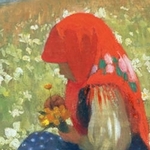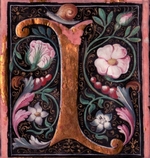- Details
Song of the week: Im Frühling (F. Schubert) - I. Bostridge, J. Drake
 My friend I asked me a few days ago why hadn't I written a post about the arrival of spring. I told her that I've done it some years; I usually think of it but then, for one reason or another, the weeks pass by and I'm late. However, there's an easy way to avoid that, as easy as to write the date down in my notebook, as I do with other dates. So I thought a little more and I found out why I don't write about spring; It's so obvious that I didn't realise: I don't really like spring. One of my favourite moments of the year is when branches are on full bud, and almond trees begin to bloom; something has changed, and now the sun begins to warm and evenings are a bit longer. But that's not in spring, that's still in mid-January. If we're lucky enough and have some cold days in February, we can enjoy one of the luxuries of winter: to feel the fresh air in contrast to the heat of the sun [...]
My friend I asked me a few days ago why hadn't I written a post about the arrival of spring. I told her that I've done it some years; I usually think of it but then, for one reason or another, the weeks pass by and I'm late. However, there's an easy way to avoid that, as easy as to write the date down in my notebook, as I do with other dates. So I thought a little more and I found out why I don't write about spring; It's so obvious that I didn't realise: I don't really like spring. One of my favourite moments of the year is when branches are on full bud, and almond trees begin to bloom; something has changed, and now the sun begins to warm and evenings are a bit longer. But that's not in spring, that's still in mid-January. If we're lucky enough and have some cold days in February, we can enjoy one of the luxuries of winter: to feel the fresh air in contrast to the heat of the sun [...]- Details
Song of the week: Pamiętam ciche, jasne, złote dnie (M. Karłowicz) - P. Beczala, H. Deutsch
 On Christmas Eve, I heard some songs on the radio by a Polish composer that I liked. A few weeks later, I also heard some other songs on the radio by another Polish composer and I thought I should spend some time learning about Polish song because I hardly knew anything about it. Some days ago, I talked about Sibelius, and how his songs weren't known well enough because their Swedish language became a barrier for singers; something similar happens to Polish songs. It's probably even more difficult to make them known because there are less singers with an international projection whose own language is Polish. But then, one of them, tenor Piotr Beczala, handed me this post on a silver platter when sang the beautiful song we're listening today during his recital at the Palau de la Música Catalana some weeks ago. Beczala and Deutsch offered several concerts before and after, and all of them[...]
On Christmas Eve, I heard some songs on the radio by a Polish composer that I liked. A few weeks later, I also heard some other songs on the radio by another Polish composer and I thought I should spend some time learning about Polish song because I hardly knew anything about it. Some days ago, I talked about Sibelius, and how his songs weren't known well enough because their Swedish language became a barrier for singers; something similar happens to Polish songs. It's probably even more difficult to make them known because there are less singers with an international projection whose own language is Polish. But then, one of them, tenor Piotr Beczala, handed me this post on a silver platter when sang the beautiful song we're listening today during his recital at the Palau de la Música Catalana some weeks ago. Beczala and Deutsch offered several concerts before and after, and all of them[...]- Details
Song of the week: Der Nussbaum (R. Schumann) - Victoria de los Ángeles, G. Moore
 In Catalan, Idyll has the same meaning that in English, "A short poem or prose piece depicting a rural or pastoral scene, usually in idealized terms.". However, I'm not sure in English, idyll is usually understood as a love story too, the word’s meaning in this post. Not long ago, I realized that during our five years together, I told, in more or less detail, some love stories related to a poet, others to a songwriter, or both; at least, so many as to deserve a letter in the Liederabend's alphabet.
In Catalan, Idyll has the same meaning that in English, "A short poem or prose piece depicting a rural or pastoral scene, usually in idealized terms.". However, I'm not sure in English, idyll is usually understood as a love story too, the word’s meaning in this post. Not long ago, I realized that during our five years together, I told, in more or less detail, some love stories related to a poet, others to a songwriter, or both; at least, so many as to deserve a letter in the Liederabend's alphabet.- Details
Song of the week: Die stille Stadt (J. Sibelius) - G. Finley, E. Gardner / S. Isokoski, I. Paananen
 Sibelius' songs are not as well-known as they should; most of them are based on poems in Swedish, a language which is not familiar to many singers; the fact that the composer used his own language is as natural as it is that it became a barrier for the singers. At his time, the song’s profits came mainly from the sale of scores, and Sibelius' market was reduced; maybe that's why his publisher, Robert Lienau, suggested him to compose a cycle from poems in German; Sibelius had lived some time in Germany, so the language didn't become a trouble. I don't know if this initiative to expand his market was financially worthwhile for the composer and the editor, I hope so, but if the aim was to compose some songs that, eventually, would become famous, I’m afraid it didn't work. The six German songs, collected as opus 50, are hardly known and most recordings are, like the rest [...]
Sibelius' songs are not as well-known as they should; most of them are based on poems in Swedish, a language which is not familiar to many singers; the fact that the composer used his own language is as natural as it is that it became a barrier for the singers. At his time, the song’s profits came mainly from the sale of scores, and Sibelius' market was reduced; maybe that's why his publisher, Robert Lienau, suggested him to compose a cycle from poems in German; Sibelius had lived some time in Germany, so the language didn't become a trouble. I don't know if this initiative to expand his market was financially worthwhile for the composer and the editor, I hope so, but if the aim was to compose some songs that, eventually, would become famous, I’m afraid it didn't work. The six German songs, collected as opus 50, are hardly known and most recordings are, like the rest [...]- Details
Song of the week: Der Tod und das Mädchen (F. Schubert) - W. Holzmair, U. Eisenlohr
 Lost in translation. That's what I thought when, just before a performance of Der Tod und das Mädchen (Death and the Maiden), a translation of the poem by Matthias Claudius was heard. Tod is a masculine noun; mort, the Catalan word for death, a feminine noun; as this point wasn't clarified, the original dialogue between a man (death) and a woman became a dialogue between two women. I told my friend J. that gender swap brought a twist to the story of seduction. And he said: what story of seduction? The conversation became general (that was a "Sopar Líric", a dinner concert at the 7 Portes, one of the oldest restaurants in Barcelona) and we forgot about it. The following day, J. sent me a WhatsApp saying that my comment was most intriguing; we spent some time exchanging messages and I told him that I would write this post about that Schubert's lieder.
Lost in translation. That's what I thought when, just before a performance of Der Tod und das Mädchen (Death and the Maiden), a translation of the poem by Matthias Claudius was heard. Tod is a masculine noun; mort, the Catalan word for death, a feminine noun; as this point wasn't clarified, the original dialogue between a man (death) and a woman became a dialogue between two women. I told my friend J. that gender swap brought a twist to the story of seduction. And he said: what story of seduction? The conversation became general (that was a "Sopar Líric", a dinner concert at the 7 Portes, one of the oldest restaurants in Barcelona) and we forgot about it. The following day, J. sent me a WhatsApp saying that my comment was most intriguing; we spent some time exchanging messages and I told him that I would write this post about that Schubert's lieder.











